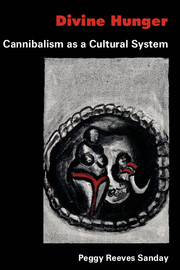Book contents
- Frontmatter
- Contents
- Preface
- Acknowledgments
- Introduction
- The symbols that give rise to a cannibalistic consciousness
- The mythical chartering and transformation of cannibal practice
- 6 The faces of the soul's desires: Iroquoian torture and cannibalism in the seventeenth century
- 7 Raw women and cooked men: Fijian cannibalism in the nineteenth century
- 8 Precious eagle-cactus fruit: Aztec human sacrifice
- 9 The transformation and end of cannibal practice
- 10 Conclusion: Other symbols and ritual modalities
- Notes
- References
- Index
7 - Raw women and cooked men: Fijian cannibalism in the nineteenth century
Published online by Cambridge University Press: 05 June 2012
- Frontmatter
- Contents
- Preface
- Acknowledgments
- Introduction
- The symbols that give rise to a cannibalistic consciousness
- The mythical chartering and transformation of cannibal practice
- 6 The faces of the soul's desires: Iroquoian torture and cannibalism in the seventeenth century
- 7 Raw women and cooked men: Fijian cannibalism in the nineteenth century
- 8 Precious eagle-cactus fruit: Aztec human sacrifice
- 9 The transformation and end of cannibal practice
- 10 Conclusion: Other symbols and ritual modalities
- Notes
- References
- Index
Summary
Cannibalism among this people is one of their institutions; it is interwoven in the elements of society; it forms one of their pursuits, and is regarded by the mass as a refinement.
Reverend Thomas Williams, missionary to Fiji from 1840 to 1853In nineteenth-century Fiji, cannibalism was a key symbol, the focal paradigmatic gesture upon which orderly social relations were mythically and ritually based. The passions exhibited in cannibal custom – the rage, joy, fierce aggressiveness, and sexual excess – were deeply etched in the Fijian collective psyche and social foundation. In many respects, nineteenth-century Fijian culture can be characterized as “a pure culture of the death instinct,” a phrase Freud used to describe the sadistic superego seen in melancholia. Warfare was one of the bases of Fijian society. Periods of peace in epic tales receive special mention as interludes between the intertribal warfare. When a tribe settled for any length of time in one place without fighting, this fact was recorded as worthy of note. Flying over parts of Fijian territory, which is composed of numerous islands, one can see the surviving earthworks of scores of circular ditched or moated fortifications. The Fijian dictionary contains many obsolete terms referring to war and cannibalism, the names of war clubs, and numerous words pertaining to clubbing and spearing.
- Type
- Chapter
- Information
- Divine HungerCannibalism as a Cultural System, pp. 151 - 168Publisher: Cambridge University PressPrint publication year: 1986



